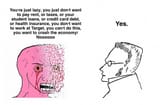>>24630293The refutation of this seems fairly simple to me. Meaningful consent requires mutual awareness of the stakes and context. The poster in the screenshot could have applied the same "what if they just start licking and we're both enjoying ourselves?" logic to a child, demented or psychotic person, or retard. Everyone would recognize these scenarios as heinously immoral because all these people can't understand what is happening. The person being licked has greater awareness of the "true" context and moral stakes: This is a sexual act. Thus, they have a moral obligation to override the lower-level, "quasi-consent" of the licker.
It may seem counterintuitive but the same logic applies to animals. Yes, a dog just thinks it's licking something and enjoying itself. But if you respect your dog (or any animal) as a kind of childlike moral agent with moral rights, you have an obligation to prevent it from being exploited or getting itself into unfair contexts. Conversely, if you see all thinking beings as amoral agents "making their own decisions" such that it's "up to them" what they accept and don't accept, sure, you can defend bestiality, but then you can also defend molesting a demented person or a child, because within your moral ontology it would no longer be immoral. But nobody in their right mind defends this position because it obviously regresses into Sadean nihilism.
The premises and stakes of the moral dilemma are fairly simple: Is consent limited to a thinking being saying "Yes" to something, either explicitly, or implicitly (i.e., by engaging in it)? This is obviously absurd and the reductio is obvious: a senile person could then "consent" to sex with their own child. If you see a son talking his senile elderly mother into sex as "manipulation," you have a moral ontology that stipulates consent is more complicated than the quasi-consent of mere yes-saying. If you see a son doing this to his mother and say "Eh, where's the victim? Both had a good time" you are essentially defending a very thin utilitarian consequentialism that is hard to prevent from imploding into "dog eat dog," solipsistic moral nihilism.
Within the moral ontology most people in practice hold, animals are wards, like children or the mentally defective or naive. Essentially, your dog is your dumb friend who doesn't know better. You should act in such a way toward him that, if he were to suddenly gain awareness and understanding exactly on par with your own in a week (like the dog in Stapledon's Sirius), he would still retroactively affirm his actions.




